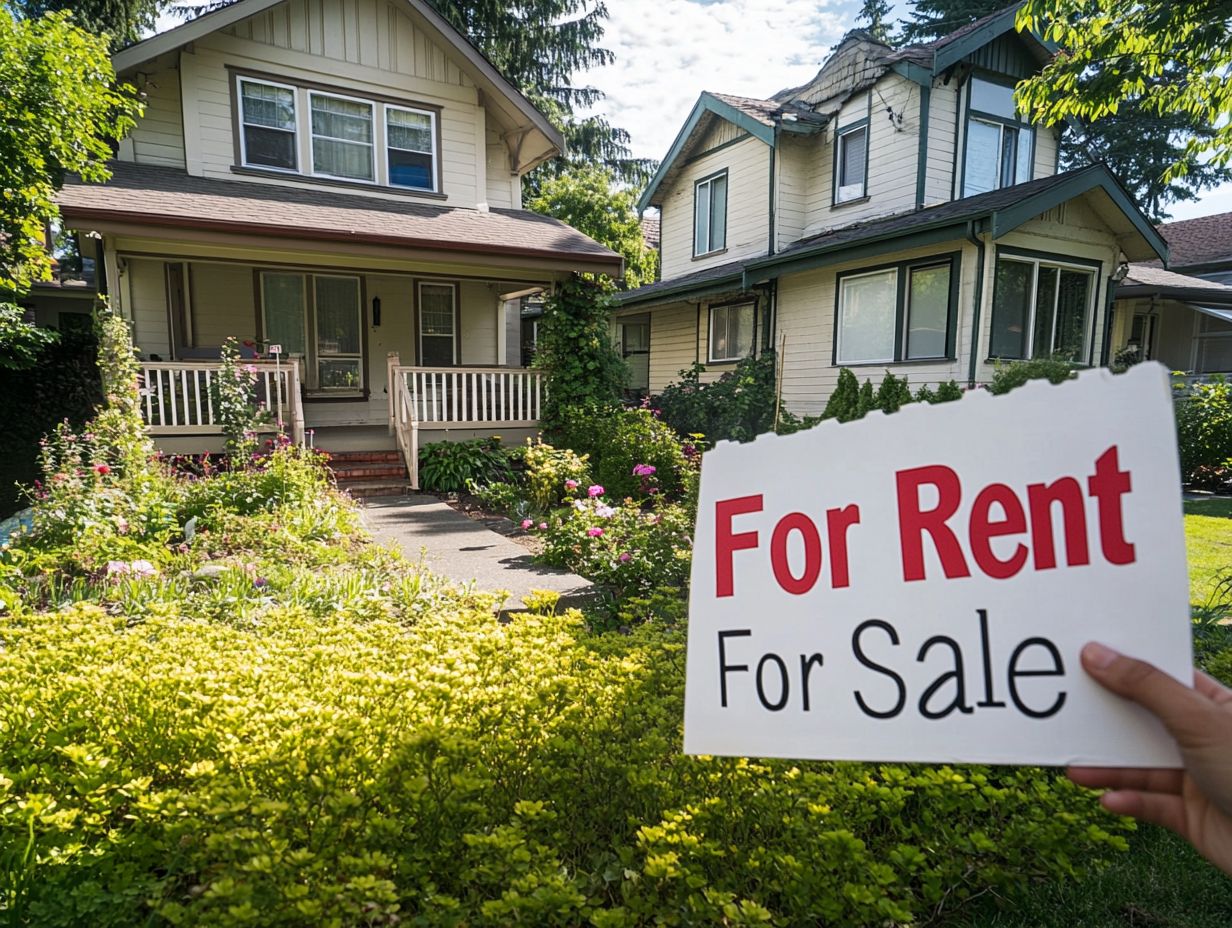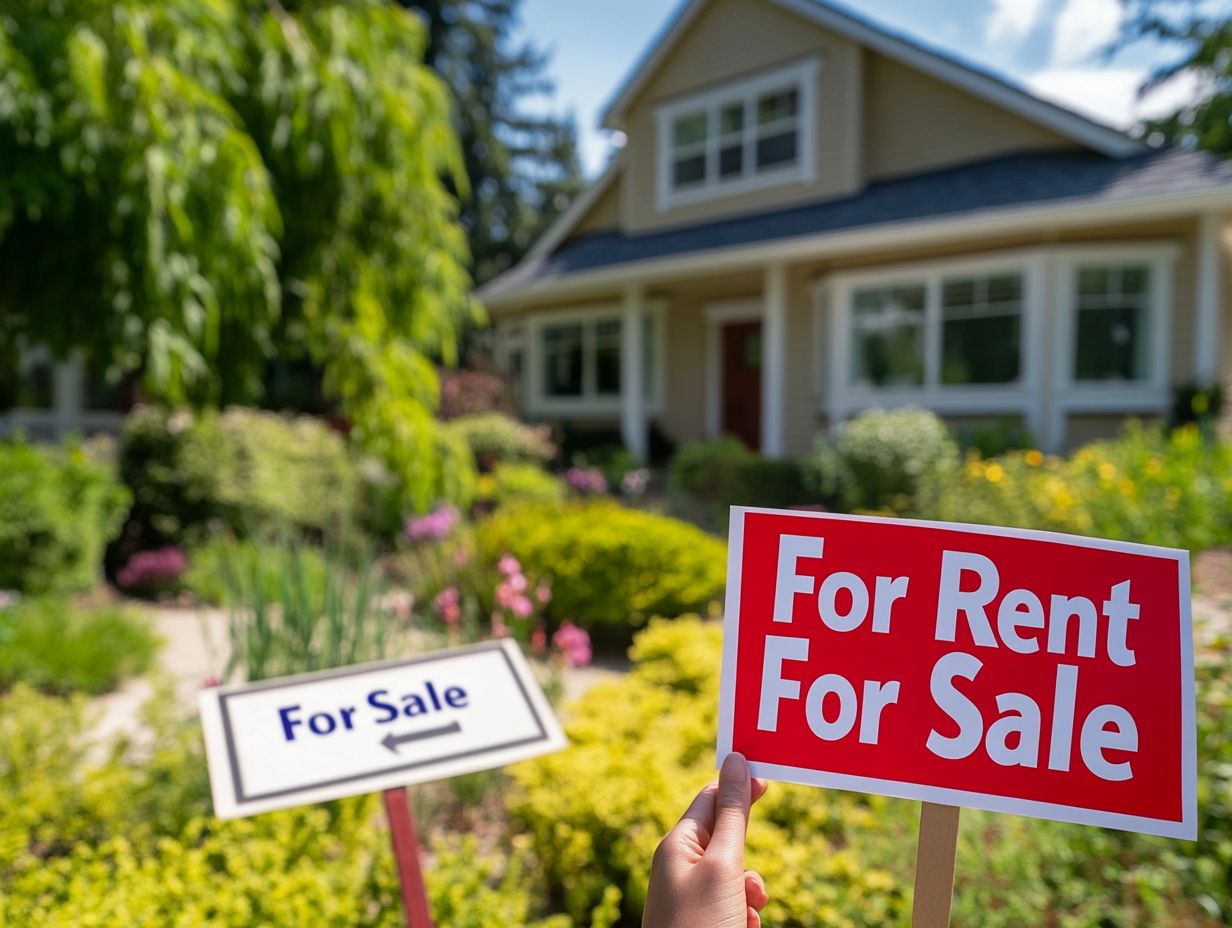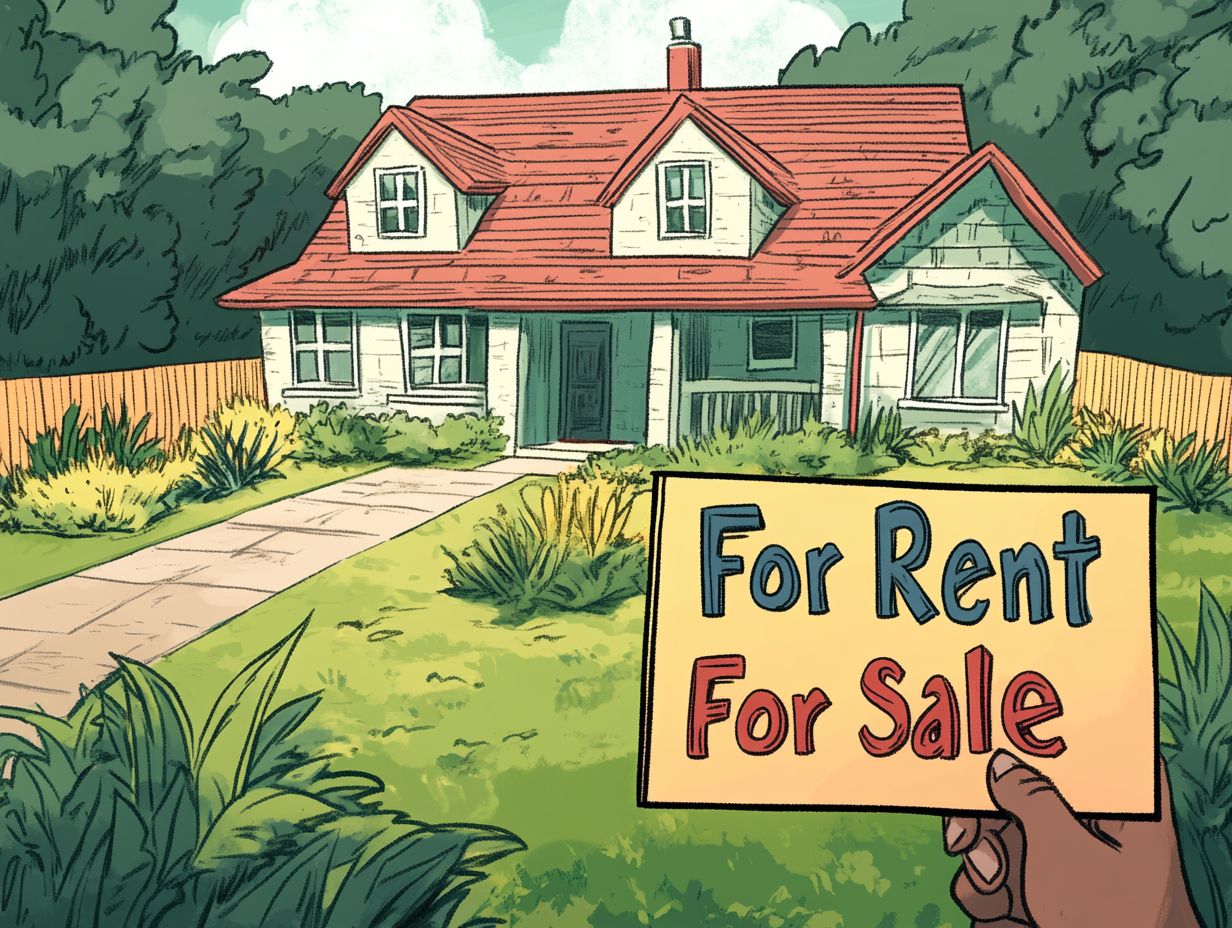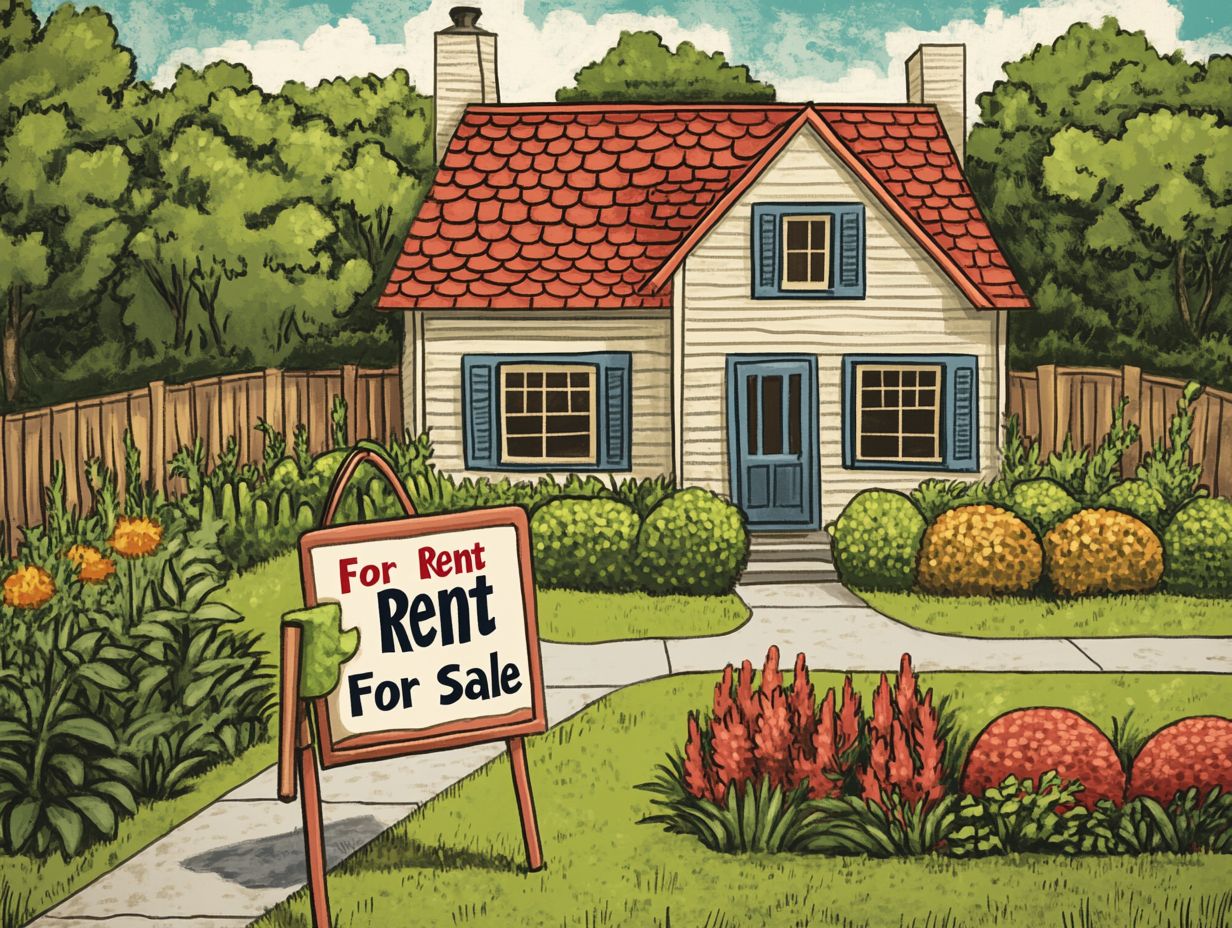Can I Rent My Home Before Selling?
Deciding whether to rent or sell your home is an important decision that can significantly influence both your finances and lifestyle.
In this article, you ll delve into the essential differences between renting and selling a property. You’ll uncover the benefits and risks that come with renting before making a sale.
You’ll explore important factors to consider, along with the necessary steps for successfully renting, as well as viable alternatives to ensure you make an informed decision.
Whether your goal is to maximize your investment or streamline your transition, this guide provides valuable insights to navigate your options effectively.
Contents
- Key Takeaways:
- Understanding Renting and Selling a Home
- Benefits of Renting Your Home Before Selling
- Risks of Renting Your Home Before Selling
- Factors to Consider Before Renting Your Home
- Steps to Renting Your Home Before Selling
- Alternatives to Renting Your Home Before Selling
- Frequently Asked Questions
- Can I rent out my home before selling?
- What are the risks of renting out my home before selling?
- Do I need to inform my mortgage lender if I want to rent out my home before selling?
- What are the tax implications of renting out my home before selling?
- What are my responsibilities as a landlord if I rent out my home before selling?
- Can I still sell my home while it is being rented out?
Key Takeaways:

Renting your home before selling can yield significant financial and practical advantages. You can generate income and minimize expenses. Yet, be mindful of potential legal issues and the challenge of finding reliable tenants. Always evaluate market conditions and legal factors before diving in.
Understanding Renting and Selling a Home
Understanding the details of renting and selling a home is essential for you as a homeowner. This is especially true when faced with complex financial decisions influenced by the current housing market.
You can choose to sell your house outright or rent it out to generate additional income. Both paths come with unique advantages and challenges.
Partnering with an experienced real estate agent can offer you invaluable insights into market trends and property management considerations.
By assessing buyer competition and understanding tenant rights, you can make informed choices that align with your financial objectives and lifestyle preferences in today s ever-evolving landscape.
The Differences Between Renting and Selling
The differences between renting and selling a home involve critical factors that can shape your financial landscape, such as rental income and selling costs.
As a homeowner, you must weigh potential cash flow from monthly rental income against the immediate profits from a sale. Selling your home might offer a quick influx of cash, but it often comes with hefty closing costs, agent commissions, and taxes.
Rental income, on the other hand, provides a steady revenue stream, though it comes with maintenance expenses and the occasional tenant headache.
Market conditions, including fluctuating property values and demand, also play a vital role in assessing which option may yield better returns over time. Considering these factors allows you to make informed and strategic decisions about your housing situation.
Benefits of Renting Your Home Before Selling
Renting your home before selling can present a wealth of advantages that go beyond immediate financial rewards. It allows you to build equity and generate rental income while skillfully navigating the ever-changing landscape of housing trends and market demand.
This strategy enhances your financial positioning and gives you the flexibility to make informed decisions about your next steps in the real estate journey.
Financial and Practical Advantages
The financial benefits of renting out your home are noteworthy. You can generate consistent rental income that helps offset your mortgage payments and contributes to building equity.
It may also reduce the closing costs usually associated with selling. This rental income reduces financial stress and lets you hire property management services, ensuring that tenant background checks are conducted with care.
By thoroughly vetting potential renters, you can minimize risks related to late payments or property damage. Effective property management simplifies your responsibilities, covering maintenance requests and tenant communication.
Handling these aspects efficiently can lead to long-term stability, giving you the freedom to scale your investments and explore additional financial strategies aimed at maximizing your profit potential related to housing.
Risks of Renting Your Home Before Selling

Renting your home before selling can offer distinct advantages, but it s crucial to weigh the associated risks.
You may encounter potential rental shortages and face the responsibilities of being a landlord. Both can complicate the selling process and elevate moving costs.
Potential Challenges and Drawbacks
The challenges of renting your home include increased landlord responsibilities and fluctuating rental income. Tenant background checks can also significantly impact your overall housing expenses.
These factors can influence your selling price and decisions, especially in a volatile housing market. For example, if rental income declines due to vacancy or non-payment, you may find yourself reevaluating whether to sell or continue renting. This can affect your financial stability.
The necessity for thorough tenant screening can lead to additional costs, eating into your profit margins. In a shifting market where values can be unpredictable, these issues not only affect your immediate cash flow but may also deter potential buyers who view the property as more of a liability than an asset.
Factors to Consider Before Renting Your Home
Before you decide to rent out your home, take a moment to consider several key factors.
Consider the current market conditions, the demand for rentals in your area, and the legal aspects influencing tenant rights and your responsibilities as a property manager.
Evaluating these elements can lead to more informed decisions and a smoother rental experience.
Market Conditions and Legal Considerations
Understanding market conditions and legal considerations is crucial for homeowners renting out their property. Factors such as rental demand, tenant rights, and landlord insurance can profoundly influence your rental experience and the financial viability of your endeavor.
Navigating property taxes and legal obligations adds another layer of complexity to your rental journey. Stay updated on local tax regulations, as these can significantly impact your net rental income.
Unforeseen tax liabilities or compliance issues might arise, potentially affecting your cash flow and profitability. By being aware of tenant rights, you ensure compliance with laws designed to protect renters, fostering a positive relationship that could lead to longer leases.
Ultimately, grasping these nuances gives you the power to make well-informed decisions that enhance your rental income potential while minimizing legal risks.
Steps to Renting Your Home Before Selling
Renting your home before selling requires careful consideration and a sequence of essential steps.
- Draft a comprehensive rental agreement.
- Conduct thorough background checks on potential tenants.
- Calculate moving costs.
Aligning your strategy with rental price predictions is crucial for maximizing your investment.
Important Tasks and Preparations

Important tasks for homeowners renting out their property include effective property management, crafting a comprehensive rental agreement, and implementing thorough tenant background checks. This ensures a seamless rental experience.
Additionally, manage moving costs with precision, as unexpected expenses can quickly spiral and affect both you and your tenants.
Understanding your responsibilities as a landlord is vital for nurturing a harmonious relationship with your renters. This includes maintaining the property, adhering to local housing laws, and promptly addressing any issues that arise.
By prioritizing these aspects, you can cultivate an environment of trust and satisfaction, which is fundamental for achieving long-term success in the rental market.
Alternatives to Renting Your Home Before Selling
Exploring alternatives to renting your home before selling can unveil a range of selling options tailored to your financial goals.
This approach becomes particularly advantageous in a fluctuating rental market, allowing you to make more informed decisions that align with your aspirations.
Other Options for Selling Your Home
Considering alternatives for selling your home can significantly enhance your decision-making process. For example, using good market trends to your advantage or evaluating investment properties helps you minimize selling costs while maximizing your property’s value.
Exploring various pricing techniques, such as competitive pricing or strategic discounting, attracts a wider pool of potential buyers. Thorough market analysis means looking at home prices and buyer interest in your area, deepening your understanding of current trends and highlighting your property’s unique selling points.
Consulting with real estate professionals gives you valuable insights into buyer behavior and market demands. With this knowledge, you can position your home more effectively, paving the way for a smoother and potentially more profitable sales experience.
Frequently Asked Questions
Can I rent out my home before selling?
Yes, you can rent out your home before selling it to earn additional income while waiting for the sale.
What are the risks of renting out my home before selling?

Risks include finding a reliable tenant, potential property damage, and legal complications. Research the rental process and consult a real estate professional before making a decision.
Do I need to inform my mortgage lender if I want to rent out my home before selling?
Yes, it’s essential to inform your mortgage lender about your plan to rent out your home. This could affect your loan terms, so ensure you have the proper permissions.
What are the tax implications of renting out my home before selling?
Renting out your home may have tax implications, such as rental income being taxable. Consulting a tax professional will help you understand these implications fully.
What are my responsibilities as a landlord if I rent out my home before selling?
As a landlord, your responsibilities include finding a tenant, collecting rent, maintaining the property, and complying with landlord-tenant laws. Understanding these responsibilities is key to being a successful landlord!
Can I still sell my home while it is being rented out?
Yes, you can sell your home while it is rented out. Just ensure you have a lease agreement in place with the tenant and follow all legal procedures for selling a rental property. Consulting a real estate professional can guide you through this process.
Act quickly! The right decision now can lead to better offers later. Consider reaching out to a professional for help with your home sale.






